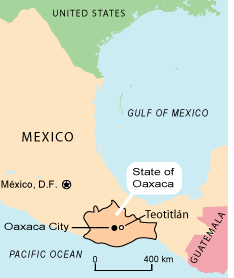The Mission Mill Museum in Salem, Oregon, will be opening a new exhibit of weavings by Zapotec Women from the town of Teotitlán del Valle tomorrow, February 3. Pastora Gutierrez, the leader of the women’s cooperative in Teotitlán that produced the weavings, will be attending a reception at the museum tonight from 5:30 – 7:00. She will be giving a presentation at the museum tomorrow at noon about the work of Teotitlán women and the efforts of the cooperative.
 The museum website provides a good overview of the exhibit, including a couple color photos of the weavers at work and some information about the women’s cooperative responsible for the weavings. Their Vida Nueva (New Life) cooperative provides support to the women who are members so they can perfect their techniques, meet the challenges of daily life, share ideas, and sell their work directly to customers. It is helping them bypass middlemen and gain the respect they deserve.
The museum website provides a good overview of the exhibit, including a couple color photos of the weavers at work and some information about the women’s cooperative responsible for the weavings. Their Vida Nueva (New Life) cooperative provides support to the women who are members so they can perfect their techniques, meet the challenges of daily life, share ideas, and sell their work directly to customers. It is helping them bypass middlemen and gain the respect they deserve.
The cooperative members do everything by hand, from washing the wool, carding it, spinning the yarn, dyeing it, and weaving it into their artistic creations. Their designs portray motifs, symbols, and patterns that represent traditional Zapotec views of the world. The website describes the lengthy hand work necessary to turn the raw wool into beautiful rugs.
The website provides a special focus on Pastora Gutierrez and on La Vida Nueva. Starting in the 1950s, Teotitlán women joined men in weaving work, but a half-century later they still have a hard time gaining respect for their creative efforts, much less for their political and social contributions to the community. Members of the cooperative, started in 1996, consist of older single women, widows, single mothers, and other young women. With the aid of the cooperative, they are now getting fair prices for their weavings.
The cooperative also helps the women share their social concerns by allowing them to exchange information on domestic violence, health issues, and women’s rights. The members still have to do their traditional work, such as care for children and animals, work in the fields, clean house, shop, make tortillas, and perform community or ceremonial duties.
The lives of the Teotitlán women are portrayed in much greater detail in a new book by Lynn Stephen on Zapotec women, described in today’s review. The book includes a discussion of Pastora Gutierrez and a picture of her. While the museum website provides a good introduction to the exhibit, hopefully a visit to the museum will inspire people to obtain and read the new book.